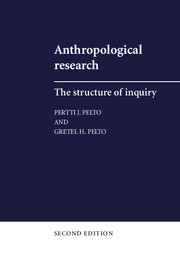Book contents
- Frontmatter
- Contents
- Preface to second edition
- Preface to first edition
- 1 The domain of methodology
- 2 Science and anthropology
- 3 Operationalism in anthropological research
- 4 Units of observation: emic and etic approaches
- 5 Tools of research – I
- 6 Tools of research – II: nonverbal techniques
- 7 Counting and sampling
- 8 Measurement, scales, and statistics
- 9 Art and science in field work
- 10 Research methods, relevance, and applied anthropology
- 11 Building anthropological theory: methods and models
- Appendixes
- Bibliography
- Index
1 - The domain of methodology
Published online by Cambridge University Press: 05 June 2012
- Frontmatter
- Contents
- Preface to second edition
- Preface to first edition
- 1 The domain of methodology
- 2 Science and anthropology
- 3 Operationalism in anthropological research
- 4 Units of observation: emic and etic approaches
- 5 Tools of research – I
- 6 Tools of research – II: nonverbal techniques
- 7 Counting and sampling
- 8 Measurement, scales, and statistics
- 9 Art and science in field work
- 10 Research methods, relevance, and applied anthropology
- 11 Building anthropological theory: methods and models
- Appendixes
- Bibliography
- Index
Summary
In simple, personalized terms the essence of research methodology lies in seeking answers to the following basic question: How can we find “true and useful information” about a particular domain of phenomena in our universe? This fundamental question involves two closely related problems.
How can we personally investigate some domain of phenomena in order to obtain true and useful information?
How can we know, with some assurance, what other persons (researchers) mean when they assert propositions about information, and how can we judge whether to believe them?
The first problem directs our attention to the techniques and conditions necessary for exploration of our phenomenal world. If we wish, for example, to gain some new information about stellar bodies and their behavior, it is likely that a telescope would be a handy tool in this search for information. The many different domains of phenomena in our universe each require their special tools and techniques for gathering knowledge about them. The study of bacteria and other microorganisms requires a microscope; the examination of electrical circuitry requires various meters and other devices; getting knowledge about the anatomical characteristics of animals requires surgical techniques and tools for looking at features that are generally hidden from view.
- Type
- Chapter
- Information
- Anthropological ResearchThe Structure of Inquiry, pp. 1 - 16Publisher: Cambridge University PressPrint publication year: 1978

